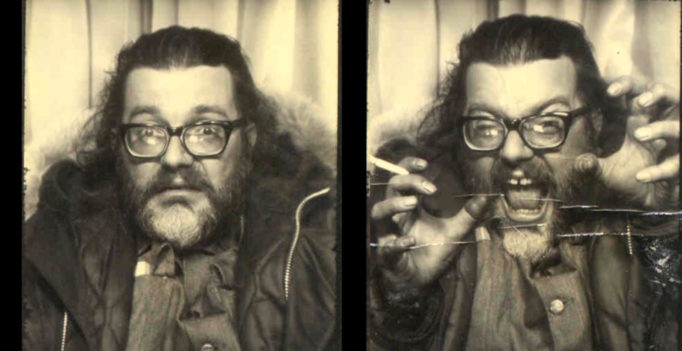In the late 1980’s, Del Close set out to write his autobiography, Wasteland, for DC comics. In Wasteland, the actor and comedian, who mentored comedy legends from John Belushi to Tina Fey but found little material success in his own career, presented a fictionalized and darkly surreal version of his life story. In director Heather Ross’ semi-experimental documentary, For Madmen Only: The Stories of Del Close, Wasteland serves as a frame for a deeper examination of Close’s life and career. As the film follows Close’s attempt to write his life and memories into a graphic form, it also explores the connection between the bizarre, finished pages of the comic book and Close’s relationships with his students, colleagues, friends, and own psyche.
Close’s claim to fame was improvisational comedy. Specifically, the notion that improv comedy could be both an artform and an experience in and of itself, rather than a means to an end. He envisioned fully improvised shows and ran experimental workshops at Second City that focused on improv as a philosophy and way of life. Over the course of his career, Close influenced generations of comedians and, as For Madmen Only: The Stories of Del Close argues, altered the landscape of mainstream comedy forever. It certainly isn’t mandatory to know about Second City or Del Close going into this film, but it helps. There is an intro at the beginning that gives a SparksNotes version of his legacy (suggesting that the film is meant for the uninitiated). However, For Madmen Only: The Stories of Del Close seems uncertain of who, exactly, its audience is and how familiar they are with the subject matter. Basic, well-known information is sometimes explained in detail, while other, arguably more obscure, people, places, and events are mentioned without context or elaboration. Obviously, it is impossible to account for every viewer’s individual familiarity with pop culture – but the gaps and discrepancies in information felt a tad uneven in places.
From his boyhood in Kansas and his time spent working as a travelling fire-eater to his years working in Chicago and Toronto with Second City, Del Close lived a troubled and unusual life. I’m not generally a fan of the “tortured genius” trope, whether applied to real people or fictional characters. Luckily, the documentary doesn’t over-indulge – opting instead to view Close through the eyes of what is ultimately his life’s work: his students. Heather Ross’s film combines images from Wasteland alongside interviews with Close’s former students and footage of Close teaching and leading workshops. It also features scenes from Close’s life, reenacted by contemporary comedians such as James Urbaniak, Patton Oswalt, and Matt Walsh. The result is less a portrait of a misunderstood genius than of an influential, albeit imperfect and even abusive, teacher.
While there are a few points where I felt that For Madmen Only: The Stories of Del Close pulled its punches (for example, the overwhelming whiteness and maleness of his shows is only mentioned by one student as an off-hand comment), this tends to be the case in many documentaries that focus on a single individual’s life. The line between compassion and reverence can be a thin one; in general, I would love to see more documentary filmmakers fully engage in a critical critique of their subjects. That said, For Madmen Only: The Stories of Del Close remains a supremely entertaining and darkly funny film – and a must watch for anyone interested in the history of comedy.
**********
Do You Tweet? Follow These Tweeple:
Shannon Page: @ShannonEvePage





Be the first to comment